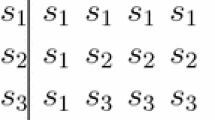Abstract
Based on quantale-enriched category, we consider algebras with compatible quantale-enriched structures, which can be viewed as fuzzification of ordered algebraic structures. We mainly study groupoids and semigroups with compatible quantale-enriched structures from this viewpoint. Some basic concepts such as ideals, homomorphisms, residuated quantale-enriched groupoids are developed and some examples of them are given. Our approach gives a complement to the approach initiated by Rosenfeld to study fuzzy abstract algebra, and these two approaches are combined in the present paper to study fuzzy aspects of abstract algebra structures.
Similar content being viewed by others
References
Lawvere F W. Metric spaces, generalized logic, and closed categories. Rendiconti del Seminario Matematico e Fisico di Milano 1973, 43: 135–166
Wagner K R. Solving recursive domain equations with enriched categories. Ph.D. Thesis, Pittsburgh: School of Computer Science, Carnegie-Mellon University, 1994
Wagner K R. Liminf convergence in Ω-categories. Theoret Comp Sci, 1997, 184: 61–104
Lai H, Zhang D. Complete and directed complete Ω-categories. Theoret Comp Sci, 2007, 388: 1–25
Zhang D. An enriched category approach to many valued Topology. Fuzzy Sets Syst, 2007, 158: 349–366
Fan L. A new approach to quantitative domain theory. Electr Notes Theoret Comp Sci, 2001, 45: 77–87
Yao W. Quantitative domains via fuzzy sets (I): Continuity of fuzzy directed complete posets. Fuzzy Sets Syst, 2010, 161: 973–987
Lai H, Zhang D. Many-valued complete distributivity. arXiv:math/0603590v2, May 2006
Axler S, Ribet K A. Lattices and Ordered Algebraic Structures. London: Springer, 2005
Rosenfeld A. Fuzzy groups. J Math Anal Appl, 1971, 35: 512–517
Bělohlávek R, Vychodil V. Algebras with fuzzy Equalities. Fuzzy Sets Syst, 2006, 157: 161–201
Rosenthal K I. Quantales and Their Applications. New York: Longman Scientific & Technical, 1990
Adámek J, Herrlich H, Strecker G E. Abstract and Concrete Categories. New York: Wiley, 1990
Kelly G M. Basic concepts of enriched category theory. London Mathematical Society Lecture Notes Series, Vol.64. Cambridge: Cambridge University Press, 1982
Bělohlávek R. Fuzzy Relational Systems: Foundations and Principles. New York: Kluwer Academic Publishers, 2002
Johnstone P T. Stone Spaces. Cambridge: Cambridge University Press, 1982
Goguen J A. L-fuzzy sets. J Math Anal Appl, 1967, 18: 145–174
Xie X Y. An Introduction to Ordered Semigroup Theory. Beijing: Science Press, 2001. 269
Kehayopulu N. On prime, weakly prime ideals in ordered semigroups. Semigroup Forum, 1992, 44: 341–346
Kehayopulu N, Tsingelis M. Fuzzy sets in ordered Groupoids. Semigroup Forum, 2002, 65: 128–132
Zadeh L A. The concept of a linguistic variable and its applications in approximate reasoning. Info Sci, 1975, 8: 199–251, 301–357; 1975, 9: 43–80
Rodabaugh S E. Powerset operator foundations for poslat fuzzy set theories and topologies, Chapter 2. In: Höhle U, Rodabaugh S E, eds. Mathematics of Fuzzy Sets: Logic, Topology, and Measure Theory. Boston, Dordrecht, London: Kluwer Academic Publishers, 1999. 91–116
Yao W. An approach to fuzzy frames via fuzzy posets. Fuzzy Sets Syst, 2011, 166: 75–89
Liu W J. Fuzzy invariant subgroups and fuzzy ideals. Fuzzy Sets Syst, 1982, 8: 133–139
Liu W J. Operations on fuzzy ideals. Fuzzy Sets Syst, 1983, 11: 37–41
Wang K Y. Some researches on fuzzy domains and fuzzy quantales. Ph.D. Thesis, College of Mathematics and Information Science, Shaanxi Normal University, Xi’an, 2012
Burris S, Sankappanavar H P. A Course in Universal Algebra. New York: Springer, 1981
Author information
Authors and Affiliations
Corresponding author
Rights and permissions
About this article
Cite this article
Zhao, B., Liu, M. Algebras with compatible quantale-enriched structures. Sci. China Inf. Sci. 57, 1–10 (2014). https://doi.org/10.1007/s11432-014-5141-5
Received:
Accepted:
Published:
Issue Date:
DOI: https://doi.org/10.1007/s11432-014-5141-5




